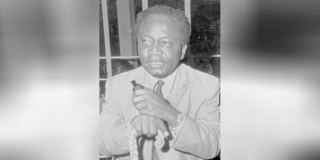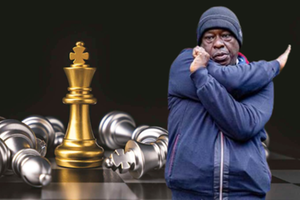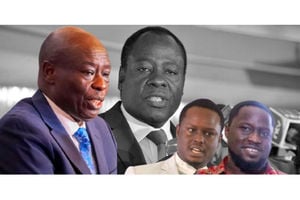Remembering Ngala, 50 years later

Ronald Ngala.
On Christmas day of 1972, Ronald Ngala died in a mysterious car crash. He was 50.
Fifty years after his death, Kenyans are still experimenting with some political ideas he fought for – but in the mild form of devolved system governments.
As Kenya’s father of devolved system of governance, Mr Ngala had before Independence, at only 37, formed the Kenya African Democratic Union to fight for a multi-racial state where regional governments were the centres of power.
That was antithetical to Jomo Kenyatta’s Kanu, which stood for a powerful central government.
Ngala had joined national politics in March 1957 when he quit as a school headmaster to contest in the first elections for African members of the Legislative Council. It was here where Mr Ngala joined the newly elected members: Oginga Odinga (Central Nyanza), Bernard Mate (Central), Daniel arap Moi (Rift Valley), James Muimi (Southern/Ukambani), Lawrence Oguda (Nyanza South), Tom Mboya (Nairobi), and Masinde Muliro (Western).
In the multi-racial parliament (then Legco), these African members had formed African Elected Members Organisation (AEMO), where Ngala emerged as a trustworthy person – even according to Tom Mboya’s biographer. “Members of AEMO had high regard for his sincerity and trustworthiness,” David Goldsworthy later wrote. It was within AEMO that Ngala’s leadership skills were tested as the opposition to the Lennox-Boyd Constitution, which sought to increase African members to 14 rather than give Independence, gained momentum.
There was then little ideological difference between the leaders, which explains why Ngala, upon formation of Kanu, had been elected as Treasurer – in absentia.
What was different was how to handle the land question. Ngala’s crusade for federalism envisioned a country where different tribes controlled their own territory, and where those fragments made a nation.
So he joined Moi, John Keen, and Masinde Muliro to form Kenya African Democratic Union (Kadu).
Ngala, then 37, believed that land grabbing would be controlled under majimbo, which would protect the minority tribes. Kanu was primarily dominated by the largest ethnic groups – the Kikuyu and Luo.
Negotiation for Kenya’s Independence was between Mr Ngala’s Kadu and Kanu. Those who disliked him said he was voicing the settlers’ opinion.
The group coalesced around Jomo Kenyatta and favoured a unitary state where power was concentrated at the top and trickled down.
Part of this thinking informs today’s devolved system of government, where the counties have taken over some national government functions. The Ngala thinking is also seen in the efforts to empower governors to take a more substantive and influential role away from the national government.
Ngala formed the first government in 1961 after Kanu refused to name a government unless Kenyatta was released. In the 1961 elections, Ngala’s Kadu had won 11 seats compared to Kanu’s 18. Thus Ngala became the leader of the government and got support from the settlers’ party, New Kenya Party, which Michael Blundell led.
So divided was the 1963 Constitutional conference in London that the Secretary of State Duncan Sandys had to seek a compromise between Kenyatta and Ngala. That there would be a single public service commission and only a two-thirds majority in a nationwide referendum would change regional powers.
In the general election of 1963, Ngala led his party to fight for the future of Majimbo. However, he failed to gain a majority in either the Senate or the House of Representatives.
With that defeat, Mr Ngala watched as his members started crossing over to Kanu. He finally failed to protect the Majimbo constitution in the 1964 changes, eventually crossing over and dissolving Kadu, thus turning Kenya into a de facto one-party state. That move would give Kenyatta authoritarian rule – and the only lone opposition voice would come from Oginga Odinga.
Under the 1963 majimbo constitution, Ngala had been elected the president of the Coast Regional Assembly.
When he dissolved Kadu on November 10, 1964, Ngala appeared to have abandoned his crusade and voted with the government for a Constitution that abolished majimbo as an instrument of governance. “I have taken Kadu to the government… to face the national issues with one voice and one purpose.”
By doing so, Ngala charted the course of Kenya’s politics by forming a new political union that saw the emergence of Kanu as a powerful party and strengthened Jomo Kenyatta’s hold onto national politics.
As Kenyatta said after Ngala abandoned the opposition: “Opposing for opposition’s sake, has now died forever and ever, Amen.”
Ngala managed to bring the coastal region, with all its fears, into the Kenyatta government. He was appointed a Cabinet minister and silenced.
In politics, he overshadowed Moi, and it was surprising that Kenyatta picked Moi as his vice–president to assuage the former Kadu members.
After dissolving his party, Ngala was identified with Kanu’s moderate wing – and later became part of Kanu B, coalescing around Tom Mboya.
In the political mischief that led to the ouster of Jaramogi Oginga Odinga from Kanu, Mr Ngala was elected Kanu’s vice-president for the Coast region. While there were various attempts to remove him as the Kanu leader for Coast province, Ngala always defeated the moves and easily won his Kilifi South seat.
At the time of his death on December 25, 1972, he was Kenyatta’s Minister for Power and Communications. An inquiry formed to investigate his death did not point any fingers.
But Ngala’s memory lingers on as the father of devolved systems of governance and, recently, a statue was unveiled in Nairobi celebrating this legacy.
[email protected]; @johnkamau1





